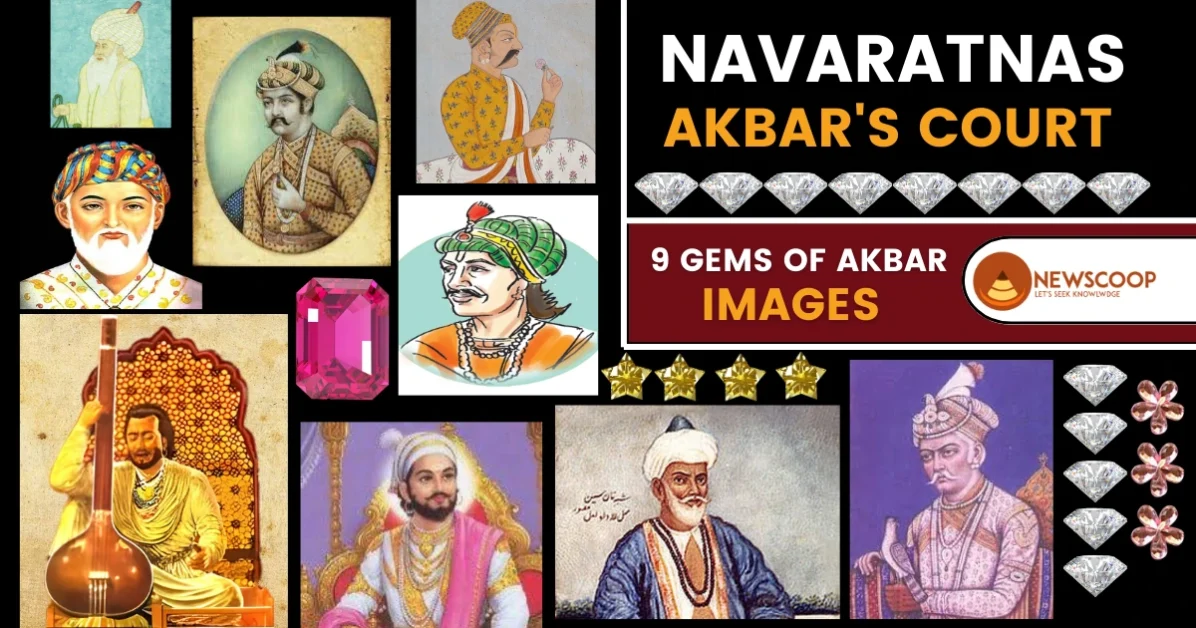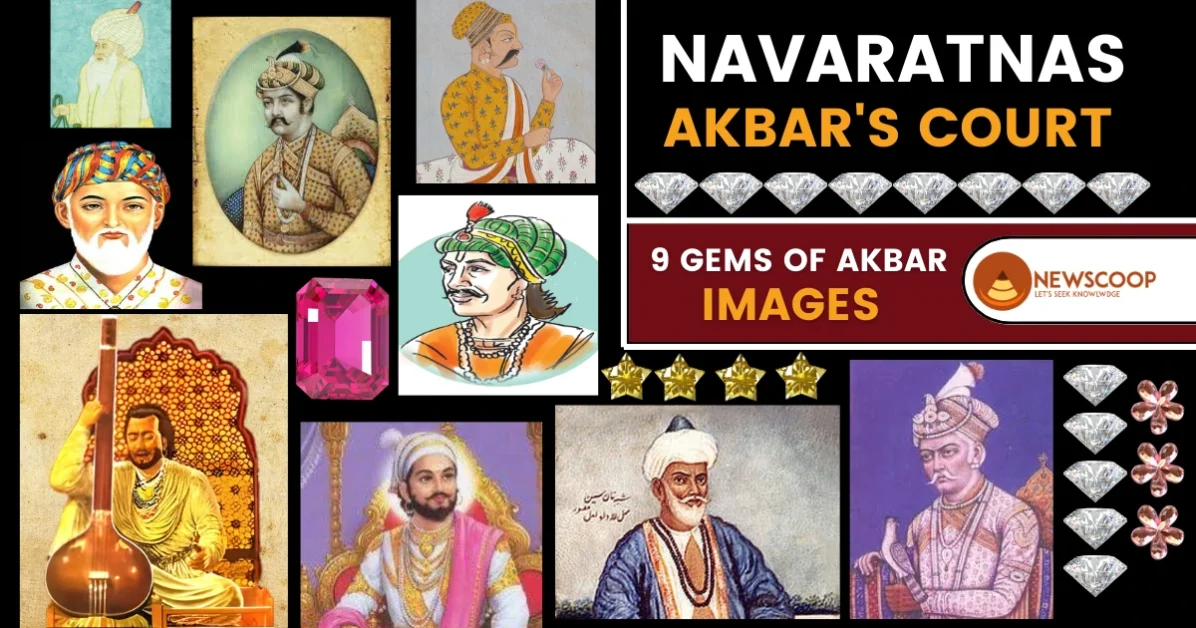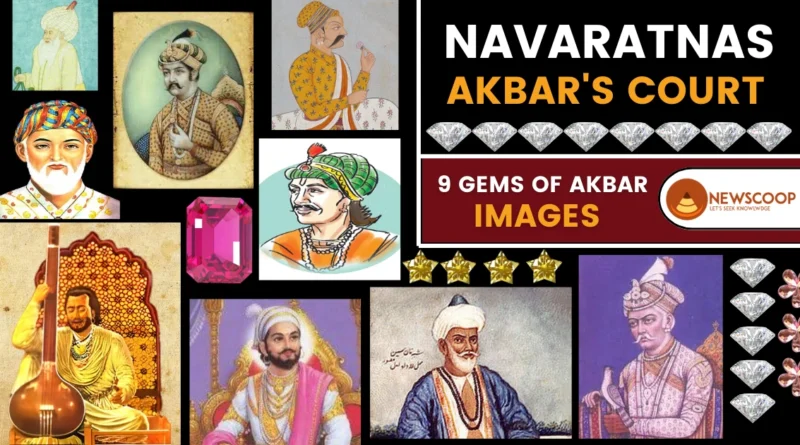9 Gems of Akbar: Nine Navratnas with Names & Images
During the reign of Emperor Akbar the Great, the Mughal Empire reached its zenith in terms of culture, art, and administration. Akbar, known for his progressive policies and a keen interest in promoting intellectual pursuits, assembled a group of nine extraordinary individuals who came to be known as the “Navratnas” or the “Nine Jewels.”
These individuals were pioneers in their respective fields and played a significant role in shaping the cultural, political, and economic landscape of the Mughal Empire. This article delves into the lives and achievements of the Navratnas of Akbar.
| Name | Field of Expertise |
|---|---|
| Birbal | Foreign Minister |
| Abul Fazl | Prime Minister |
| Todar Mal | Finance and Revenue |
| Raja Man Singh | Military Chief |
| Mulla Do-Piyaza | Home Minister |
| Faizi | Education Minister |
| Mian Tansen | Culture Minister & Singer |
| Fakir Aziao-Din | Religious Minister |
| Abdul Rahim Khan-e-Khana | Defence Minister |
Table of Contents
Introduction to Navratnas of Akbar
The Navratnas, or the Nine Jewels, were a group of exceptional individuals who served as advisors, intellectuals, and artists in the court of Emperor Akbar during the Mughal era. These individuals were handpicked by Akbar himself for their remarkable skills and contributions to various fields. The Navratnas played a crucial role in shaping the cultural, political, and intellectual landscape of the Mughal Empire.
Images of 9-Gems of Akbar

Who are Navratnas of Akbar?
The following are the names of Navratnas of Akbar:
- Abul Fazl
- Birbal
- Todar Mal
- Raja Man Singh
- Tansen
- Fakir Aziao-Din
- Mulla Do-Piyaza
- Faizi
- Abdul Rahim Khan-I-Khana

1. Abul Fazl
Abul Fazl, also known as Abu’l-Fazl ibn Mubarak, was indeed a remarkable figure and an esteemed member of the Navratnas of Akbar. Here are some additional points about Abul Fazl’s life and contributions:
- Education and Linguistic Abilities: Abul Fazl’s intellectual abilities were evident from a young age. He was the son of Shaikh Mubarak, an Indian scholar, and teacher, and received his early education from his father. He showed exceptional linguistic skills, learning to read and write at the age of 5. He also had a deep understanding of Arabic, which further enhanced his scholarly pursuits.
- Compilation of Ishafani Dictionary: Abul Fazl’s remarkable intelligence and determination were demonstrated in his youth when he came across an Ishafani dictionary that had been damaged by white ants. Instead of discarding it, he meticulously cleaned the eaten portions and joined blank sheets to reconstruct the dictionary. His attention to detail and perseverance allowed him to complete the entire copy of the dictionary, with only three changes distinguishing it from the original.
- Introduction to Emperor Akbar’s Court: Abul Fazl’s talents and scholarly achievements brought him to the attention of Emperor Akbar. He was introduced to the Mughal court at the age of 23, where he became an important figure in Akbar’s administration and an influential advisor to the emperor.
- Liberal Philosophy and Religious Tolerance: Abul Fazl embraced a liberal and inclusive philosophical outlook. He advocated for religious tolerance and played a significant role in promoting religious harmony within the Mughal Empire. His writings and discussions with Emperor Akbar contributed to Akbar’s policies of religious syncretism and the development of the Din-i-Ilahi, a spiritual movement that sought to bridge different faiths.
- Akbar Nama: Abul Fazl’s most renowned work is the Akbar Nama, a three-volume historical chronicle that documents the life and reign of Emperor Akbar. It is considered one of the most comprehensive and authoritative accounts of Akbar’s reign. Abul Fazl’s meticulous research and detailed descriptions of events, policies, and personalities provide valuable insights into the socio-political and cultural milieu of the Mughal Empire during that era.
- Literary and Intellectual Contributions: Beyond the Akbar Nama, Abul Fazl was also a prolific writer and scholar. He wrote extensively on various subjects, including philosophy, history, poetry, and religion. His works reflect his deep knowledge and intellectual prowess, making him a celebrated figure in the literary and scholarly circles of his time.
Abul Fazl’s intellect, writings, and contributions to promoting religious tolerance and understanding made him an invaluable member of Akbar’s Navratnas. His Akbar Nama stands as a testament to his scholarship and continues to be a significant historical source for understanding the reign of Emperor Akbar.
2. Raja Birbal
Birbal, whose real name was Mahesh Das, was indeed a significant figure among the Navratnas of Akbar. Here are some additional points about Birbal’s life and contributions:
- Hindu Adviser and Folklore Fame: Birbal, a Hindu, served as a trusted adviser and courtier in Emperor Akbar’s court. He gained immense popularity through ancient folk stories that celebrated his wit and intelligence. These folk tales portrayed Birbal as a clever and quick-witted individual, often engaging in witty exchanges with Emperor Akbar. His presence in these stories showcased his prominence and influence in the Mughal court.
- Multi-Talented Individual: Birbal was not only known for his wisdom but also for his skills as a writer and singer. He was a versatile personality who excelled in various artistic pursuits. His creativity and talents endeared him to Emperor Akbar, who valued his contributions in both intellectual and entertainment spheres.
- Military Leadership: Birbal demonstrated his leadership skills when he led an army to quell a major uprising in the northwest region in 1586. Unfortunately, he and around eight thousand troops were killed in the assault, resulting in one of the largest military losses suffered by the Mughal Empire during that time. This event marked a significant loss for the empire and deeply saddened Emperor Akbar, who mourned Birbal’s death for several days.
- Conversion to Din-i Ilahi: Birbal is known to be the only Hindu member of Akbar’s court who converted to Akbar’s religious movement called Din-i Ilahi. This syncretic faith aimed to blend elements of various religions and philosophies, fostering religious tolerance and unity within the empire.
- Folklore and Popular Culture: After Akbar’s reign, numerous folk tales and anecdotes featuring Birbal’s interactions with Emperor Akbar emerged. These tales portrayed Birbal as an exceptionally intelligent and amusing character. Over time, Birbal’s wit and wisdom became legendary in India, inspiring the creation of plays, films, and publications that showcased his cleverness. His stories also found their way into children’s comics and school textbooks, ensuring his enduring popularity.
Birbal’s presence in Akbar’s court, his reputation for wit and intelligence in folklore, and his contributions to both military leadership and cultural pursuits have cemented his place as one of the most memorable and celebrated figures among the Navratnas of Akbar.
3. Raja Todar Mal
Todar Mal, a notable member of the Navratnas of Akbar, had a humble background but rose to prominence through his administrative prowess and contributions to the Mughal Empire.
- Humble Origins and Rise to Prominence: Todar Mal was born in a Hindu family in Laharpur, Uttar Pradesh. After his father’s early demise, he faced difficulties as an illegitimate child. However, his talent as a writer caught the attention of Sher Shah Suri, and he was entrusted with the responsibility of overseeing the construction of the magnificent Rohtas Fort in Punjab.
- Service under Akbar: Following the Mughal victory over Sher Shah Suri, Todar Mal continued his service under Emperor Akbar. His administrative capabilities and loyalty earned him a place among the Navratnas of Akbar, highlighting his significance in the Mughal court.
- Appointments and Responsibilities: Todar Mal held key positions in the Mughal Empire. He was appointed as the head of Gujarat, where he played a crucial role in the region’s governance and development. He was later given command over Agra, further showcasing Akbar’s trust in his administrative abilities.
- Revenue System Reforms: Todar Mal’s most significant contribution was in the field of revenue administration. He introduced a comprehensive revenue system that included the establishment of a surveying and mapping system, standardization of weights and measures, and the division of the empire into revenue districts. This system, known as Zabt, revolutionized revenue collection and taxation and has had a lasting impact in various parts of India even today.
- Legacy and Influence: Todar Mal’s reforms in revenue administration brought stability and prosperity to the Mughal Empire. His meticulous approach to governance and his focus on efficient revenue collection have made him a highly respected figure in Indian administrative history.
Todar Mal’s journey from humble beginnings to becoming a trusted advisor of Akbar and his significant contributions to revenue administration solidify his place as an influential member of the Navratnas. His reforms continue to have a lasting impact on the governance and revenue systems of India.
4. Raja Man Singh
Raja Man Singh, a prominent member of the Navratnas, played a significant role in the Mughal Empire during Akbar’s reign. Here are some additional points about Raja Man Singh:
- Royal Lineage and Early Life: Raja Man Singh was born into the royal family of Amber (present-day Jaipur). His parents were King Bhagwant Das and Princess Bhagawati of Amber. His family, along with his predecessors, laid the foundations of the historical and political landscape of 16th-century India.
- Relationship with Akbar and Rana Pratap: Raja Man Singh was younger than Emperor Akbar by around eight years and younger than Rana Pratap, the ruler of Mewar, by about ten years. These three individuals played crucial roles in shaping the political dynamics of the time.
- Rise in Rank and Positions: After the death of his father at the hands of Akbar, Raja Man Singh was given the title of Mirza (Raja) and appointed to the rank of five thousand. He steadily climbed the ranks within the Mughal court, eventually becoming the Sardar (Commander) of 7,000 cavalry. Akbar referred to him as “Farzand” (son) due to their close relationship.
- Military Campaigns and Achievements: Raja Man Singh actively participated in several important military campaigns and battles on behalf of the Mughal Empire. He proved his valor and strategic acumen in various conflicts and played a crucial role in expanding the empire’s boundaries.
- Marriage Alliance with Mughal Imperial Family: Raja Man Singh’s daughter, Manorama Bai, married Crown Prince Dara Shikoh, the eldest son of Emperor Shah Jahan. This marriage alliance further strengthened the relationship between the Mughal imperial family and the Rajput nobility.
- Patronage of Art and Architecture: Raja Man Singh was known for his patronage of art, architecture, and cultural pursuits. He commissioned the construction of notable structures, including the renowned Amber Fort in Jaipur, which stands as a testament to his architectural legacy.
Raja Man Singh’s close association with Akbar, his military achievements, and his contributions to the cultural landscape of the Mughal Empire solidify his position as a key member of the Navratnas. His lineage and strategic prowess left a lasting impact on the history of India.
5. Tansen
Tansen, a legendary figure among the Navratnas of Akbar, was a highly accomplished musician and one of the most significant individuals in Hindustani music in India. Here are some additional points about Tansen:
- Early Life and Sponsorship: Tansen was born into a Hindu family and received his early education in engineering in present-day Madhya Pradesh, India. He began his musical career under the sponsorship of Ram Chand, a noble from the Rewa State. Tansen’s talent and fame quickly spread, establishing him as a renowned musician.
- Invitation to Akbar’s Court: Tansen’s exceptional musical abilities caught the attention of Emperor Akbar. Akbar sent emissaries to Ram Chand, requesting Tansen’s presence at the Mughal court. Initially hesitant, Tansen was encouraged by Ram Chand to expand his audience and eventually accepted Akbar’s invitation.
- Name Change and Recognition: Upon joining Akbar’s court, Tansen has bestowed the honorific title “Mian,” which means “intelligent person.” This recognition by Emperor Akbar showcased Tansen’s status as a valued member of the Navratnas.
- Versatility and Musical Achievements: Tansen was not only a singer but also an instrumentalist and composer. He excelled in various genres of music, including Dhrupad, which is a classical vocal form. Tansen’s contributions to music include the invention of several new ragas and the composition of music books such as Sri Ganesh Stotra and Sangita Sara.
- Influence and Legacy: Tansen’s musical genius and artistry left a lasting impact on Hindustani classical music. His melodic renditions and technical brilliance continue to inspire generations of musicians. Tansen’s style and compositions laid the foundation for future developments in Indian classical music.
Tansen’s status as one of the Navratnas, his versatility as a musician, and his immense contributions to Hindustani music solidify his place as a legendary figure. His legacy as one of India’s greatest musicians continues to thrive, and his compositions and teachings remain influential in the realm of Indian classical music.
6. Fakir Aziao-Din
Fakir Aziao-Din, an esteemed member of Akbar’s Navratnas, was a mystic and chief advisor to Emperor Akbar.
- Spiritual Advisor: Fakir Aziao-Din held a significant role as a spiritual advisor to Emperor Akbar. His deep understanding of mysticism and spirituality made him a trusted confidant of the emperor. Akbar valued his advice on religious matters and sought his guidance in matters of faith.
- Influence on Religious Policies: As a chief advisor, Fakir Aziao-Din played a vital role in shaping Akbar’s religious policies. He contributed to the development of Akbar’s syncretic faith known as Din-i-Ilahi, which aimed to blend elements of various religions and foster religious harmony and tolerance within the empire.
- Wisdom and Guidance: Fakir Aziao-Din’s wisdom and counsel were highly valued by Emperor Akbar. His spiritual insights and guidance helped Akbar navigate religious concerns and promote a more inclusive and tolerant environment within the Mughal Empire.
- Integration of Sufi Philosophy: Fakir Aziao-Din’s background as a mystic with a deep understanding of Sufi philosophy influenced his advice to Akbar. He promoted the principles of Sufism, which emphasized the spiritual union with the divine and the pursuit of inner enlightenment.
- Navratna Recognition: Fakir Aziao-Din’s profound impact on Akbar’s religious policies and his invaluable guidance earned him a place among the Navratnas, the nine gems of Akbar. This esteemed group consisted of exceptional individuals who made significant contributions in various fields and served as trusted advisors to the emperor.
Fakir Aziao-Din’s role as a mystic and chief advisor to Emperor Akbar highlights his significance as one of the Navratnas. His spiritual insights and influence on religious policies played a crucial role in shaping the religious landscape of the Mughal Empire during Akbar’s reign.
7. Mulla Do-Piyaza
Mulla Do-Piyaza, often depicted as Akbar’s Secretary of the Ministry, is a character that appears in folk stories but is considered fictional by most researchers.
- Folklore Character: Mulla Do-Piyaza is a popular character in folk stories and tales from the Indian subcontinent. He is often portrayed as a witty and humorous figure, known for his cleverness and comical anecdotes.
- Role in Folk Stories: Mulla Do-Piyaza’s stories typically revolve around humorous situations, wordplay, and satirical commentary on social and political issues of the time. These stories have entertained generations and have been passed down through oral tradition and written folklore.
- Emergence in Folklore: The character of Mulla Do-Piyaza first emerged in folk stories towards the end of the 19th century. Over time, his popularity grew, and he became a well-known figure in the folk traditions of the region.
- Symbolic Representation: Mulla Do-Piyaza is often seen as a representative of the common people or the common sense in folk stories. His witty remarks and humorous anecdotes reflect the wit and resilience of the ordinary person in the face of various challenges and situations.
- Cultural Impact: The stories and tales featuring Mulla Do-Piyaza have become a significant part of the cultural fabric of the Indian subcontinent. They have been adapted into plays, films, and various forms of popular media, further solidifying the character’s place in the region’s folklore.
8. Faizi
Faizi, a prominent member of Akbar’s Navratnas, was an esteemed poet, scholar, and educator in the Mughal court.
- Early Life and Education: Faizi was born in Agra in 1547. He hailed from a family of scholars, with his father being an Islamic theology scholar well-versed in Greek and philosophical literature. Faizi received his early education from his father, who nurtured his intellectual growth.
- Brother of Abu’l Fazl: Faizi was the brother of Abu’l Fazl Ibn Mubarak, another influential member of Akbar’s court and a close confidant of the emperor. Abu’l Fazl served as a key figure in Akbar’s judicature, and Faizi’s association with him further elevated his status in the Mughal court.
- Teacher to Emperor Akbar’s Sons: In 1566, Faizi was appointed as the tutor to Emperor Akbar’s sons. This position reflected the high regard and trust that Akbar placed in his scholarly abilities. Faizi played a significant role in the education and upbringing of the royal heirs.
- Minister of Education and Poet: Faizi served as the Minister of Education in the Mughal kingdom, overseeing educational matters and promoting intellectual pursuits. He also held the position of Sadr, a religious authority, for various states such as Agra, Kalinjar, and Kalpi. Faizi’s accomplishments as a poet were extensive, with thousands of poems to his name. One of his finest works is the collection of poems known as Bashir Al-Subh.
- Literary Contributions: Faizi’s poetry reflected his mastery of language, depth of thought, and eloquence. His poems explored various themes, including love, spirituality, and social commentary. His literary achievements contributed to the rich poetic tradition of the Mughal court.
Faizi’s role as an educator, poet, and scholar within Akbar’s court solidified his position among the Navratnas. His contributions to education and poetry left a lasting impact on the intellectual and literary heritage of the Mughal Empire.
9. Abdul Rahim Khan-I-Khana
Abdul Rahim Khan-I-Khana, a celebrated figure among Akbar’s Navratnas, was a poet, dewan (minister), and esteemed member of the Mughal court.
- Birth and Lineage: Abdul Rahim Khan-I-Khana was born in the town of Khan Khana, which is now known as Nawanshahr in Punjab, India. He belonged to a noble lineage and was the son of Bairam Khan, a trusted advisor and general of Emperor Akbar.
- Literary Contributions: Rahim Khan-I-Khana was a renowned poet who excelled in writing Urdu couplets (dohas) that were highly regarded for their wisdom and literary elegance. He also authored several publications on Sanskrit astrology, including Khetakautukam and Dwatrimshadyogavali.
- Protector and Tutor: Following the death of his father, Rahim Khan-I-Khana and his mother were safely brought to Emperor Akbar’s royal court. Recognizing his talent and potential, Akbar bestowed upon him the title of “Mirza Khan” and took him under his patronage. Rahim Khan-I-Khana served as Akbar’s valued protector and tutor.
- Marriage Alliance: Emperor Akbar intended for Rahim Khan-I-Khana to marry the daughter of Mirza Aziz Koka, who was the son of Aga Khan, a prominent Mughal noble. This marriage alliance further solidified Rahim Khan-I-Khana’s position within the imperial court.
- Ethical and Moral Principles: Rahim Khan-I-Khana was known for his ethical and moral principles, which were reflected in his poetry. His dohas imparted valuable life lessons and offered guidance on various aspects of human behavior and virtues.
- Patronage of Arts: Rahim Khan-I-Khana was a patron of the arts and literature, encouraging other poets and artists in the Mughal court. He played a significant role in the promotion and preservation of the rich cultural heritage of the Mughal Empire.
Abdul Rahim Khan-I-Khana’s poetic prowess, noble lineage, and close association with Emperor Akbar marked his significance among the Navratnas. His literary contributions and ethical principles continue to be celebrated and admired in the realms of Urdu poetry and Indian literature.
Conclusion
In conclusion, the Navratnas of Akbar was a group of exceptionally talented individuals who played significant roles in various aspects of Emperor Akbar’s court. These individuals contributed to the cultural, intellectual, administrative, and military achievements of the Mughal Empire during Akbar’s reign.
Their collective wisdom and expertise made them invaluable advisors and pillars of the empire, leaving a lasting impact on the history and legacy of the Mughal dynasty.
Thank You!
FAQs
Who were the Nine Gems of Akbar?
The Nine Gems of Akbar were highly talented courtiers in the Mughal Empire, including Birbal, Abul Fazl, Raja Todar Mal, Raja Man Singh, Faizi, Tansen, and Sufi saints Fakir Aziao-Din and Mulla Do-Piyaza.
Who was the talented musician and artist among the Nine Gems of Akbar?
The talented musician and artist among the Nine Gems of Akbar was Tansen. He was a legendary classical singer and one of the most celebrated musicians in Indian history.
Related Links:

